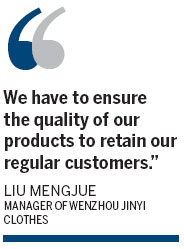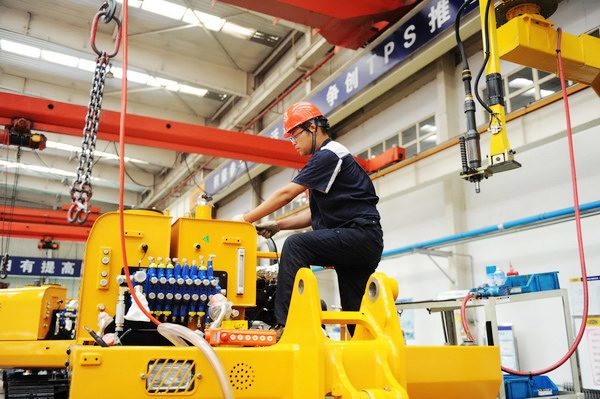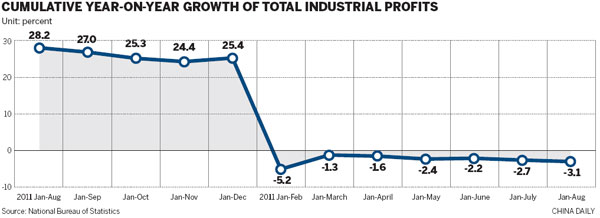

Economists say August data put added pressure on government to halt slowdown
Chinese industrial businesses saw their profits fall by 6.2 percent year-on-year in August, marking their fifth consecutive monthly drop.
Observers said the disappointing results are likely to prompt the government to adopt stronger measures to boost economic growth.
Industrial companies with at least 20 million yuan ($3.17 million) in annual revenue saw their net income decrease to 381.2 billion yuan last month, according to data released by the National Bureau of Statistics on Thursday.
The August decline of 6.2 percent was the largest reported this year, compared with a 5.4 percent fall in July and a 1.7 percent decrease in June.
In the first eight months of the year, the companies had 3.06 trillion yuan in total profits, 3.1 percent less than in the same period of 2011, the bureau said.
The lower profits may continue to drag down entrepreneurs' confidence and suppress industrial operations in the fourth quarter, putting pressure on the government to stop the country's worst economic slowdown in 22 years, economists said.
|
 An excavator assembly line in an industrial park in Qingdao, Shandong province. In August, industrial profits hit 381.2 billion yuan ($60 billion), down 6.2 percent year-on-year, the National Bureau of Statistics said on Thursday. [Photo/China Daily] |
"The industrial sector remains grim and GDP growth in the third quarter might slow to 7.3 percent year-on-year from the second quarter's 7.6 percent," said Huang Yiping, chief economist for emerging Asia at the investment banking division of Barclays Bank Plc.
During the first eight months of the year, State-owned industrial companies made 883.9 billion yuan, 12.7 percent less than that in 2011. Private-sector companies saw their profits increase to 945.4 billion yuan, up by 15.1 percent from a year earlier, the bureau said.?
Among the 41 industries the bureau's survey considered, 16 saw their profits decline and one reported a loss, the statistical agency said.
The ferrous metal smelting and rolling processing industry made 67.4 percent less net income than it had a year before, and the raw materials and chemical products manufacturing industry saw its net income decrease by 20.2 percent.
The bureau's statistics said the electronics industry's profits decreased by a mere 2.9 percent. Even so, Shen Xiangjun, sales manager of Ningbo Yunhuan Electronics Group Co Ltd, said his company, as well as others of its kind, saw its profits go down by at least 10 percent in the first eight months of 2012.
|
 |
"The electronics industry is at the forefront of the entire industrial chain, as other industries need to buy parts from us," Shen said. "If we are suffering from a profit loss, it means all of manufacturing is being hit hard.
"For one thing, we dare not explore the domestic market, for domestic consumption has not been promoted yet. For another, the European and US economies remain stagnant, which is giving the Chinese export business a hard time.
"We are so trapped. With labor costs and raw material prices ever increasing and little money to spare now for technological innovation, all we can do is simply wait and see."
A preliminary Manufacturing Purchasing Managers' Index released by HSBC Holdings Plc showed an 11th month of contraction in September, rising slightly to 47.8 from 47.6 the month before. A score above 50 indicates expansion and one below contraction.
Although industrial activity continued to weaken, especially in base metals and industrial machinery, financing conditions have improved for central government-supported infrastructure projects. That may help support the world's second-largest economy's growth in the coming quarters, Huang said.
According to the People's Bank of China, the country's central bank, 703.9 billion yuan worth of new loans were made in renminbi in August, an amount 28.33 percent higher year-on-year.
Sun Junwei, a Chinese economist with HSBC, predicted that manufacturers, especially those that tend to rely on exports, will be led to cut jobs in the months ahead.
Beijing, being well aware of that risk to the labor market, is likely to take further easing measures, Sun said.
"We have to ensure the quality of our products to retain our regular customers," said Liu Mengjue, manager of Wenzhou Jinyi Clothes, which exports most of its products to the US and some parts of Europe.
"The international prospects are so gloomy that we literally don't have any business this year. So we're building a new plant on a piece of land that we had bought a long time ago, as we have nothing better to do."
Economists called for more financial support to go to infrastructure construction in the coming months. Boosting investment is the most effective way to maintain growth amid the current circumstances, they said.
Contact the writers at [email protected] and [email protected]?
 Overdue loans pile pressure on lenders
Overdue loans pile pressure on lenders Japanese automakers face tough times in China
Japanese automakers face tough times in China Volvo plans expansion amid slowdown
Volvo plans expansion amid slowdown